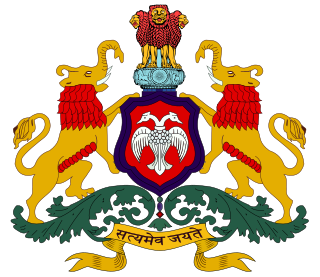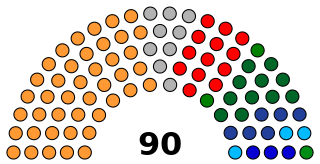
Local government is a generic term for the lowest tiers of governance or public administration within a particular sovereign state.
A governor is an administrative leader and head of a polity or political region, ranking under the head of state and in some cases, such as governors-general, as the head of a state's official representative. Depending on the type of political region or polity, a governor may be either appointed or elected, and the governor's powers can vary significantly, depending on the public laws in place locally. The adjective pertaining to a governor is gubernatorial, from the Latin root gubernare.
In many countries, a mayor is the highest-ranking official in a municipal government such as that of a city or a town. Worldwide, there is a wide variance in local laws and customs regarding the powers and responsibilities of a mayor as well as the means by which a mayor is elected or otherwise mandated. Depending on the system chosen, a mayor may be the chief executive officer of the municipal government, may simply chair a multi-member governing body with little or no independent power, or may play a solely ceremonial role. A mayor's duties and responsibilities may be to appoint and oversee municipal managers and employees, provide basic governmental services to constituents, and execute the laws and ordinances passed by a municipal governing body. Options for selection of a mayor include direct election by the public, or selection by an elected governing council or board.
A municipal council is the legislative body of a municipality or local government area. Depending on the location and classification of the municipality it may be known as a city council, town council, town board, community council, rural council, village council, or board of aldermen.

The Government of Karnataka, abbreviated as GoK or GOKA, or simply Karnataka Government, formerly Government of Mysore or Government of Mysore State is a democratically elected state body with the governor as the ceremonial head to govern the Southwest Indian state of Karnataka. The governor who is appointed for five years appoints the chief minister and on the advice of the chief minister appoints their council of ministers. Even though the governor remains the ceremonial head of the state, the day-to-day running of the government is taken care of by the chief minister and their council of ministers in whom a great amount of legislative powers are vested.

The government of Texas operates under the Constitution of Texas and consists of a unitary democratic state government operating under a presidential system that uses the Dillon Rule, as well as governments at the county and municipal levels.

The government of the U.S. State of Oklahoma, established by the Oklahoma Constitution, is a republican democracy modeled after the federal government of the United States. The state government has three branches: the executive, legislative, and judicial. Through a system of separation of powers or "checks and balances," each of these branches has some authority to act on its own, some authority to regulate the other two branches, and has some of its own authority, in turn, regulated by the other branches.

Thiruvananthapuram Municipal Corporation is the oldest and the largest city corporation in the state of Kerala in India. It is the municipal corporation that administrates the city of Thiruvananthapuram (Trivandrum), the capital of Kerala. The city corporation is spread over 214.86 km2 with 100 wards and a population of 9,57,730 inhabitants. It includes the Legislative Assembly constituencies of Thiruvananthapuram, Vattiyoorkavu, Nemom, Kazhakkoottam and 5 wards of the Kovalam constituency. The current mayor is Arya Rajendran of the Communist Party of India (Marxist); presently the youngest mayor in the country.

Pune Municipal Corporation (PMC) is the civic body that governs the inner limits of Pune, India. It is in charge of the civic needs and infrastructure of the metropolis, which is spread over an area of 484.61 sq. km. and has 3.4 million residents. Established on 15 February 1950, the executive power of the PMC is vested in the Municipal Commissioner, an Indian Administrative Service (IAS) officer appointed by the Government of Maharashtra. The position is held by Vikram Kumar, IAS.The general body of the PMC consists of 162 directly elected councilors, popularly known as "corporators", headed by a mayor. Murlidhar Mohol (BJP) was elected as the mayor and Sunita Wadekar as the deputy mayor by the newly elected in April 2021. The land for Pune Municipal Corporation was donated by Late Hon. Shri. Bhausaheb Shirole (Patil) who was second Mayor of Pune city and later became an MLC. The Pune Municipal Corporation has launched an e-Governance initiative, with the goal of leveraging Information Technology to mobilize Government resources and optimize their utilization in order to provide a superior level of service.
A municipal corporation is a type of local government in India which administers urban areas with a population of more than one million. The growing population and urbanization of various Indian cities highlighted the need for a type of local governing body that could provide services such as healthcare, education, housing and transport by collecting property taxes and administering grants from the state government.

Pimpri Chinchwad Municipal Corporation (PCMC) is the civic body that governs Pimpri-Chinchwad which includes Pimpri, Akurdi, Chinchwad, Nigdi, and the remainder of the northwestern city limits of Pune, India. It was established on 11 October 1982. It governs an area of 181 km2 with a population of 1.72 million. The executive power of the PCMC is vested in the Municipal Commissioner, an Indian Administrative Service (IAS) officer appointed by the Government of Maharashtra. The position is held by Shekhar Singh (IAS) during the pandemic in late December 2020. The general body of the PCMC consists of 128 directly elected councilors, popularly known as "corporators", headed by a mayor. Rahul Jadhav (BJP) was elected as the mayor and Sachin Chinchwade (BJP) as the deputy mayor in August 2018. The PCMC headquarters is situated on the Old Pune Mumbai Highway alongside the freeway in the city of Pune.

The Brihanmumbai Municipal Corporation (BMC), or Municipal Corporation of Greater Mumbai (MCGM) is the governing civic body of Mumbai, the capital city of Maharashtra.

Patna Municipal Corporation (PMC) is the civic body that governs Patna, the capital of Bihar in India.Municipal Corporation mechanism in India was introduced during British Rule with formation of municipal corporation in Madras (Chennai) in 1688, later followed by municipal corporations in Bombay (Mumbai) and Calcutta (Kolkata) by 1762. Patna Municipal Corporation consists of democratically elected members, is headed by a Mayor, and administers the city's infrastructure, public services, and supplies.

There are 8 divisions and 64 districts in Bangladesh, each district further subdivided into upazila. The area within each subdistrict, except for those in metropolitan areas, is divided into several unions, with each union consisting of multiple villages. Direct elections are held for each union, electing a chairperson and a number of members. In 1997, a parliamentary act was passed to reserve three seats in every union for female candidates. Following elections in the 2014–16 period, 25.2% of councillors were women, up from 23.4% in the 2011–13 period.

The Meerut Nagar Nigam (MNN) also known as Meerut Municipal Corporation (MMC) is the civic body that governs Meerut city. Established under the Uttar Pradesh Municipal Corporation Act-1959, it is responsible for the civic infrastructure and administration of the city.
In many countries, a municipal commissioner is an official in a municipal government such as that of a city or a town.

The Batala Municipal Corporation is a nagar nigam which administers the city of Batala, Punjab. It has 50 members elected with a first-past-the-post voting system and 1 ex-officio member which is MLA for Batala. In 2019 Government of Punjab decided to upgrade Batala Municipal council into Municipal Corporation, earlier it was a municipal council.
In India, a mayor is the ceremonial head of a city's municipal corporation and is often referred to as the first citizen of the city. The mayor's role is primarily ceremonial and lacks executive powers, with the municipal commissioner serving as the executive head of a municipal corporation. The method of electing mayors—whether directly or indirectly—depends on state legislation.












